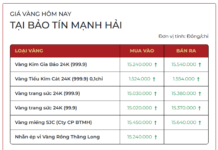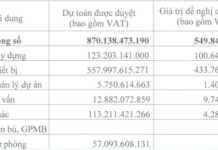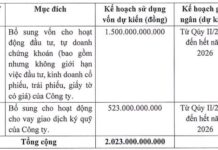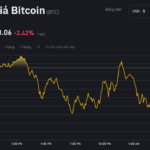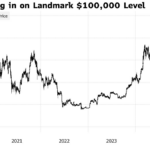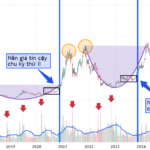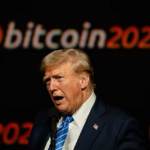 |
Why is this a concern?
Blockchain technology has various applications, and its discussion in Vietnam is significant. Blockchain is a technology used to record and update all transaction information of an asset (such as digital currency, property ownership certificates, driver’s licenses, or information) in a ledger. The system can verify the authenticity of the address code for each information packet, the content within, and the feasibility of each exchange if it is a digital currency (such as checking for sufficient funds). Verification is not done centrally but rather distributed across blocks, relevant addresses, and ultimately, the address containing the ledger. A block records the most recent exchanges within a specific time frame and is sealed with a timestamp after verification. All transactions, which can be cross-border, are conducted quickly and without intermediaries, verified by machines, and recorded in the ledger. However, this also means that third parties, such as governments or anyone else, cannot know the true owners of the exchanges and the final amount of assets held by a digital wallet and their location.
Digital Currency and Blockchain Technology
Why has blockchain technology gained so much attention recently? This is because this technology is used to create digital currencies like Bitcoin, allowing direct exchanges between owners and partners, avoiding the prying eyes of anyone, especially the government, who does not know the real owner (meaning there is a real address for taxation or legality checks) and the purpose of their transactions. As a result, Bitcoin is mainly used for speculation and can also facilitate smuggling and funding other illegal activities across national borders.
Bitcoin was created by an individual, Satoshi Nakamoto, whose true identity remains unknown. Nakamoto, or his group, created Bitcoin in 2009 and initially decided on an initial amount of 1 million bitcoins, with the software limiting the total supply to 21 million bitcoins. A total of 18.78 million bitcoins have been created so far, with a market value of $1.5 trillion at the time of writing.
Other digital currencies like Ethereum initially had no supply limit, but since August 2021, miners have agreed to burn coins by sending rewards to a “burn station” to reduce a certain percentage. This method, which is voluntary, aims to limit the supply to maintain or increase the price of Ethereum. In addition to burning, the new software design also increases transaction fees when the network’s transaction volume exceeds 50% of its capacity. This is similar to central banks’ approach to curbing inflation by reducing the money supply and increasing transaction fees (interest rates). However, the price of virtual currencies mainly depends on the demand of those willing to buy for speculation and to evade government control and taxation.
It’s challenging to determine how many types of digital currencies have ever been created, as it is an unregulated market. Some sources mention millions, while others say over 13,000. However, there are currently about 10,000 different types of digital currencies traded on the market, 430 of which have a global market value of over $100 million each.
Digital currencies are not prohibited in many countries, and exchanges are taxable in principle, just like other commercial transactions. Countries like the US, Canada, Australia, and France allow and treat them as assets subject to taxation.
However, in reality, the state can only tax exchanges and capital gains resulting from price changes if the digital currency is converted into cash within the country. It is unrealistic to think that digital currency can replace national currencies.
Assuming there is a national digital currency, blockchain technology is not about creating it but rather facilitating its exchange. It is unclear what central banks are thinking, but a national digital currency could be a national token guaranteed by the central bank, with the government having the right to reduce or increase the supply and transaction fees (interest rates). If held in a digital wallet, all wallet owners must have a specific, verified personal address and pay taxes according to their transactions. The national token can be exchanged between commercial banks and the central bank based on blockchain, instead of centralization as is currently the case. The hypothesis of a national digital currency is unlikely to materialize in the near future due to high operating costs, as evidenced by the experience of non-monetary blockchain exchanges, especially the excessive electricity consumption for transaction verification and the software’s inability to quickly adjust the money supply when necessary monetary policies need to be implemented.
Blockchain Technology and Non-Monetary Assets
The purpose of blockchain technology is not just to create money but also to facilitate the exchange of non-monetary assets and store information, ensuring its immutability through a hash value. This type of blockchain has not seen much success due to a few issues: what cost basis should be used to pay for mining services to verify transactions, and where should the money come from to be bought from outside and transferred into the blockchain? If it is for internal use, to control the supply chain of materials and products within a company, a bank, or a few businesses that regularly transact with each other, a decentralized blockchain may not be as efficient as a centralized verification system since there are very few wallets in a supply chain compared to the millions of wallets in the digital currency space.
Experts have also pointed out 16 drawbacks of blockchain technology, the most significant being excessive electricity consumption, slow speed with many participants, difficulty in integrating with other blockchains, and the need for experts to manage the process, making it costly.
Objective of Vietnam’s Blockchain Technology Development Strategy
According to Vietnam.vn, a news agency of the Vietnam News Agency: “On October 22, 2024, Deputy Prime Minister Ho Duc Phoc signed and issued Decision 1236/QD-TTg, announcing the National Strategy on Application and Development of Blockchain Technology until 2025, with an orientation towards 2030. Specifically, the Government aims to build 20 reputable blockchain brands in terms of platforms, products, and services based on blockchain technology in the region; maintain the operation of a minimum of three centers or special zones for blockchain testing in major cities to form a national network; and have representatives in the top 10 training and research institutions in blockchain technology in Asia.”
The content of the decision does not yet clarify the objectives of blockchain technology, especially regarding digital currencies. And if it is a Bitcoin-style digital currency, this is a cause for concern.
Digital currencies are currently widely used in Vietnam, with VietnamPlus.vn reporting that Vietnamese citizens have transacted $120 billion worth of digital currencies.
The first concern is whether the use of these digital currencies is related to any illegal activities, especially money laundering.
Another concern is the high electricity consumption associated with digital currency mining. A single Bitcoin transaction consumes approximately 1,224 kWh of electricity. It is possible that many blockchain companies are attracted to Vietnam due to its lower electricity prices compared to other countries.
Vu Quang Viet – Ho Van Tien
The Power of Trump’s Tweets: Bitcoin Surges Past $95,000
Bitcoin surges past $95,000 during early morning trading in Asia, setting an unprecedented record. This monumental leap occurs amidst news of President-elect Donald Trump considering establishing a new position within the White House dedicated to cryptocurrency policy.
The Future of Bitcoin (Part 2): Uncovering Cycles, Understanding Market Pulse.
In each growth cycle, BTC consistently forms new peaks and troughs, with each trough and peak being higher than the previous cycle. This consistent pattern indicates a strong potential for long-term growth, and there is a high probability that this upward trajectory will continue in the current cycle.
The Race to $100,000: Can Bitcoin’s Bull Run Continue?
According to cryptocurrency investors who spoke with MarketWatch, Bitcoin’s price is likely to reach the $100,000 mark, thanks to its recent surge in the aftermath of Donald Trump’s victory in the US elections. While the future beyond this significant milestone remains uncertain, the digital currency has seen a boost, with investors attributing it to Trump’s win.









